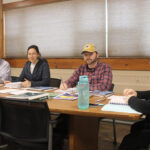In 1880 the government decided to identify citizens physically or morally defective. The result is the Federal Census Schedules for the Defective, Dependent, and Delinquent Classes. It delves into personal areas that are humiliating and in that period not usually mentioned. Almost all genealogists will find a relative in one of the schedules because they were broad enough that most families have someone who fell into one of these categories.
There are separate schedules for the insane, idiots, deaf-mutes, blind, indigent (paupers), homeless children (abandoned or orphaned), and prisoners. Each schedule contains a list of questions and often a medical diagnosis. Keep in mind these diagnoses are from 1880. Dementia is there, mania covered a wide range of behaviors, and melancholia would probably today be depression.
To be defective a person could have any number of conditions: blind from birth or from an accident or disease, speech impediments, maimed, crippled either at birth or from a disease such as polio or cerebral palsy, the bedridden, those with epilepsy, people with severe scoliosis, people missing a limb, victims of stroke, people with Parkinson’s or any number of diseases or conditions we would treat today but which were beyond 1880 science. Also included were the elderly with memory issues and undoubtedly people with learning disorders. The questions asked included how long a person had been disabled, whether the person needed to be restrained, was in an institution, or suffered from more than one issue. Multiple issues were common.
The Dependent schedule includes people who couldn’t support themselves for whatever reason and who didn’t receive assistance from family members. Quite often the cause of indigence was old age when a person couldn’t physically work, but people with disabilities could be listed on this schedule as well. So, here you’ll find duplicates of the defective questions. A crippled person who couldn’t work, as would someone who had suffered a stroke, would be on this schedule. It’s not unusual to find people who had several conditions.
The homeless children schedule recorded children orphaned or abandoned. Often they were in orphanages, poor farms, or private homes with their “keep” paid by the town. One of the questions asked was whether the child’s parents were married. Orphaned or mixed race children who were illegitimate suffered an additional stigma.
Prisoners were found in any type of jail and even people in protective custody are on this schedule. Questions asked included years incarcerated, type of offense, if hard labor was required, and even if someone was scheduled for execution. And, people in prison can show up on the disabled schedule such as blind, deaf, etc.
This is one of the saddest and cruelest of the federal censuses. But it offers details about your family you may not find anywhere else so it’s worth checking. The schedules are available on Ancestry.com and other websites. When I use it I am reminded that if it were repeated today so many of us would be listed in one category or another.
Columnist Nancy Battick of Dover-Foxcroft has researched genealogy for over 30 years. She is past president of the Maine Genealogical Society, author of several genealogical articles and co-transcribed the Vital Records of Dover-Foxcroft. Nancy holds a MA in History from UM and lives in DF with her husband, Jack, another avid genealogist. Reader emails are welcome at nbattick@roadrunner.com.




